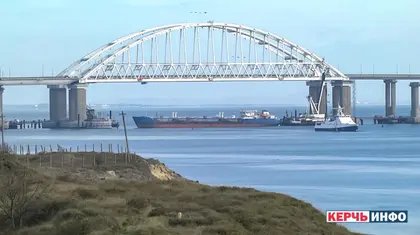At an emergency meeting late on the night of Nov. 25, the Military Cabinet passed a resolution to impose a martial law in Ukraine in the wake of an attack on and seizure of Ukrainian Navy boats by the Russian coast guard in the neutral waters of the Azov Sea on Nov. 25.
President Petro Poroshenko said he would appeal to the Ukrainian parliament on Nov. 26 to approve his declaration of martial law, which could lead to widespread compulsory military service, restrictions on media and public demonstrations and suspension of elections, among other measures. Andriy Parubiy, speaker of the Verkhovna Rada, said that parliament will convene at 4 p.m. on Nov. 26.
Read more: What martial law in Ukraine could mean for nation
“We have irrefutable evidence that today’s aggression against Ukrainian Navy boats was not an error or coincidence. It was an aimed action, including opening fire on Ukrainian naval personnel,” Poroshenko said at the meeting with top government and military officials.
The Ukrainian Navy reported that Russian coast guard boats opened fire on three Ukrainian boats in the Azov Sea on the evening of Nov. 25 after Russian officials announced that they had trespassed its territorial waters. The Kerch Strait – the strait connecting the Black Sea and Azov Sea – has been closed off for all non-military vessels.
In a shootout, Ukraine’s small armored artillery boats Berdyansk and Nikopol sustained damages and were immobilized. Ukrainian tugboat Yani Kapu had been rammed by a Russian coast guard ship Don earlier in the morning.
All three vessels have been seized by a Russian special operations unit, the Ukrainian Navy press service reported.
Reportedly, at least six Ukrainian naval officers have been wounded.
However, Ukraine’s Chief of the General Staff Viktor Muzhenko said that there were 23 naval officers on three military boats that were arrested by Russians. Ukrainian officials have no contact with the rest of the personnel of the detained vessels.
The Ukrainian Navy’s website http://navy.mil.gov.ua/ has been down due to DDos attack.
Reaction
In Kyiv, at around 11 p.m. a crowd has gathered in front of the Russian Embassy chanting “Death to Russia” and burning tires.
Ivanna Klympush-Tsintsadze, deputy prime minister for European integration in Ukraine, called on the international community to have a quick response to Russia’s aggressive actions.
“The civilized world should urgently react to yet another blatant attack of Russia on Ukrainian ships in Azov sea. (Russia) doesn’t need pretexts (to) escalate the military situation. With every move, it tests our common resilience to break of rules & laws. (International) inaction will bless violence,” she wrote on Twitter.
Ukraine Foreign Minister Pavlo Klimkin called the brazen attack “a war in neutral waters” and said that Ukraine needs not just statements from its friends and allies but a clear collaborative action plan.
NATO spokesperson Oana Lungescu released a statement saying that NATO is closely monitoring developments in the Azov Sea and Kerch Strait and is in contact with the Ukrainian authorities.
“We call for restraint and de-escalation,” Langescu’s statement read on behalf of NATO. “NATO fully supports Ukraine’s sovereignty and its territorial integrity, including its navigational rights in its territorial waters. We call on Russia to ensure unhindered access to Ukrainian ports in the Azov Sea, in accordance with international law.”
Maja Kocijančič, the spokesperson for Federica Mogherini, the High Representative of the European Union Foreign Affairs & Security Policy, also urged Russia to restore freedom of passage through the Kerch Strait and de-escalate immediately.
“The events in the Sea of Azov are a demonstration of how instability and tensions are bound to rise when the basic rules of international cooperation are disregarded,” Kocijančič’s statement read.
Samantha Power, former U.S. ambassador to the United Nations, also tweeted: “Very significant new aggression by Russia. Ukraine calling now for an emergency meeting of (United Nations Security Council).”
Lithuania’s Minister of Foreign Affairs Linas Linkevicius was also one of the first allies to respond.
“Strongly condemn Russia’s move to physically block Kerch Strait and ramming of Ukrainian boat. Cannot be qualified differently than an act of aggression & another blatant violation of the international maritime law. Such actions undermine the security of the whole region,” Linkevicius wrote.
Anne Applebaum, American and Polish journalist and Pulitzer Prize-winning author, wrote on Twitter:
“My guess: while (U.S. President Donald) Trump is distracted by fallout from midterms and UK is distracted by Brexit, good time to create instability in Ukraine in advance of elections.”
Ex-Swedish Prime Minister Bildt Carl Bildt tweeted: “Looks like Russia intends to block the Kerch straits for Ukrainian vessels. A clear breach of international law.”
And Latvia’s Minister of Foreign Affairs Edgars Rinkēvičs wrote: “Closely following alarming news from Azov Sea, blockade of maritime traffic of Kerch Strait by Russia and attack against Ukrainian Navy are clear violations of international law and should be condemned by the international community, Russia must take steps to de-escalate the situation.”
John Herbst, former U.S. Ambassador to Ukraine and current director of the Atlantic Council’s Eurasia Center, said: “This is a double provocation, the latest in a dangerous game that the Kremlin launched last April when it began to ‘inspect’ commercial ships going to and from the Ukrainian ports in the Sea of Azov. Moscow has two objectives. First, it would like to raise the cost on the Ukrainian economy…The second objective is the effort to entice Ukraine into taking some sort of military action to protect shipping to and from its ports.”
You can also highlight the text and press Ctrl + Enter




